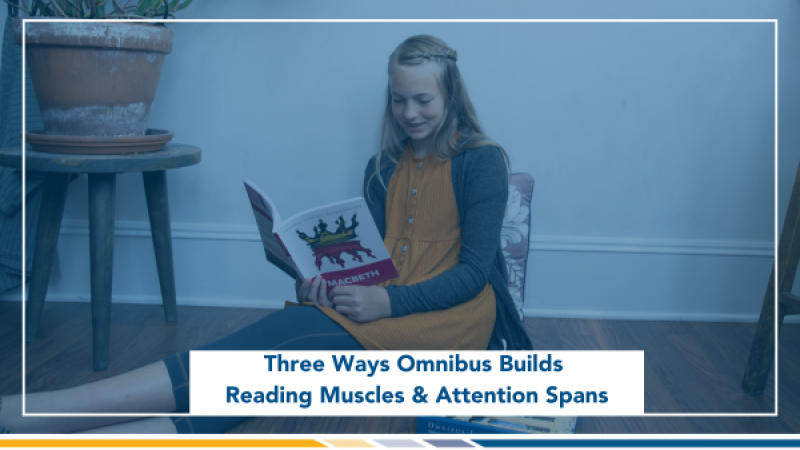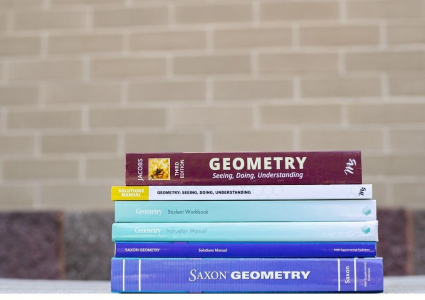Three Ways Omnibus Can Build Up Reading Muscles and Stretch the Attention Spans

Your attention span shrinks every year. The more you read on the phone, the more it atrophies. Our children are facing this sort of diminishment even more than adults. Many live through their phones. This isn’t healthy, but even for those who moderately use the phone, the world beckons us to develop ADD with shiny objects and flashing lights. We live in Vanity Fair—not the magazine but the worldly and ultimately oppressive carnival in Pilgrim’s Progress.
This can make the job of a classical educator challenging. The hill might seem so steep that it feels impossible. No one wants, like Sisyphus, to push rocks uphill only to see them eventually slide back down again, but when you pass out Herodotus to seventh graders, you might hear a few gulps or sighs.
There are, of course, many techniques that you can use, but the success of Omnibus is not that they would pass the class but that they would begin to hunger to continue learning and reading when no one has the scourge of a failing grade hanging over their head.
Today, I will briefly explore a few techniques that you can use to build up the reading muscles of Omnibus students rather than overwhelming them. None of these is a magic bullet, but I have seen all of them be good tools that can help an individual student or a class get the feel and rightly order the loves toward getting to know their forefathers through the Great Books. So, here are three techniques that I have found effective over the years.
First Technique: Start With Fun Short Reads and Work Up
The Oakland Raiders’ owner, Al Davis, used to say, “Just win, baby!” Now, no one ever wins all the time, but Al knew that the first win helps you win the second game, and the second win helps you win the third. Winning breeds winning. When taking a student into Omnibus, taking stock of their general reading level is good. If it is low, start the year with relatively easy-to-read and enjoyable books. Get the win. You might want to start by reading initially from the Secondary list. Narnia is great. Lord of the Rings is awesome. Find books linked to the historical period, but find ones where you can gain traction and build confidence.
Remember, however, this technique suits the beginning of the adventure and should be used there. Something could be wrong if you are still bench pressing the same weight one year after starting your training! Still, start at a point where most can find enjoyment and begin building up reading muscle.
Second Technique: The Comprehension Boost of Reading Out Loud
I have heard that St. Augustine invented silent reading. While this is probably not true, he seems to be the first to write down that he was reading stuff in his mind without saying the words out loud. For most of human history, all reading was done out loud. This blessed those who could not read because they could listen; it also blessed the readers, even if they were reading alone. There is a deeper level of comprehension that usually accompanies reading out loud. When you are reading as a family, if you make your children follow along if they are not reading aloud, then they can pick up context clues and vocabulary from listening and avoid the temptation to guess or skip. Reading aloud focuses the mind. It also allows for your children to ask questions or for the teacher to make sure that comprehension occurs. Sometimes, it is amazing what we miss!
Third Technique: Selective Reading When the Going Is Hardest
I read books cover to cover. It is hard for me to stop even when I know I don’t like the book. I am recovering from this mix of irrational loyalty and works of righteousness. My wife skips all of the stuff in the beginning and quits if she doesn’t like things. Both have value, but when you're trying to build muscle, start on machines that help you exercise without being overwhelmed by minutiae. Take Moby Dick, for instance. I love those chapters that help you have pauses between crests of the rising action. There is one about blubber. There is another about a whale skull. We should read these, but if the student struggles, consider skipping these chapters or making them optional. Take the time to summarize them and their importance for your child but use their limited strength to read that which is most necessary and feasible.
Celebrate the smallest of wins! Small victories can lead to bigger wins in the future. Just win, baby!






